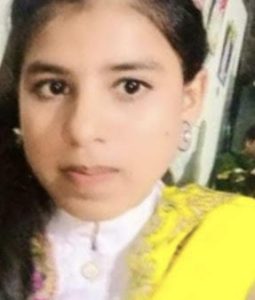 Pakistani police have refused to register a First Information Report (FIR) in the case of Sania Amin, a 13-year-old Christian girl who has reportedly been kidnapped, converted to Islam and forcibly married.
Pakistani police have refused to register a First Information Report (FIR) in the case of Sania Amin, a 13-year-old Christian girl who has reportedly been kidnapped, converted to Islam and forcibly married.
Abduction, conversion and forced marriage is a serious ongoing issue affecting Pakistan’s minority Christian and Hindu communities, and police often fail to take action against the Muslim perpetrators, older men who are sometimes already married.
Sania Amin went missing on 4 April after leaving her home in Anjotar village, Sialkot city in Punjab province to buy groceries. Local eyewitnesses reported seeing three Muslim young men take her by force and drag her away through the streets.
Sania’s parents were away visiting a relative in a nearby town at the time and her three older sisters were occupied with household duties: Atia was cooking, while Hina and Arooj were washing clothes. At around 12.30 pm Atia called out to Sania to help her in the kitchen, but received no response. “Initially, I thought she had gone out to buy some snacks from a shop in the next street,” Atia said, but amid mounting concern she led a search of the village before phoning her parents Amin Masih and Nargis Bibi, who rushed home and joined their neighbours in the search.
Amin then went to Saddar Police Station in Sialkot and pleaded with police to recover his daughter but despite a night-long search, including a raid on the alleged abductor’s home, police refused to file a First Incident Report against him. The reason given was Sania’s conversion to Islam and marriage to Muhammad Saif Ali, one of the three alleged abductors – police said this nullified their obligation to intervene.
Sania’s family has received documents confirming her conversion and marriage. On the morning of 5 April an envelope was left at the family home containing a marriage certificate between Sania and Muhammad Saif Ali (23), a local Muslim who was already married. A false age of 18 was given for Sania on the marriage certificate: she is 13 years old according to the National Database and Registration Authority and her birth certificate. The Punjab Marriage Restraint Act (2015) stipulates that the minimum age for marriage for a girl is 16 years.
Amin Masih told British Asian Christian Association, “This unbelievable news shattered my world. In sorrow, my wife started beating her chest and fell to the ground with grief.” Amin added that he had been threatened that if he did not withdraw his application against the perpetrator, his other daughters would be kidnapped too.
Nasir Saeed, Director of CLAAS-UK, expressed his profound concern over the escalating trend of abduction, forced conversion and marriage of young Christian girls in Pakistan, stating: “It’s incomprehensible how such cases continue to surface daily, and yet the Pakistani government, law enforcement agencies, and courts seem indifferent to the plight of these victims and their families. The blatant inaction in Sania’s case, where even the child marriage restraint laws are being overlooked, is a stark reminder of the challenges faced by religious minorities in Pakistan.”
Sania has a younger brother as well as her three sisters, and their father earns a living stitching footballs. CLAAS-UK reports that he has “appealed to higher authorities” in the hope of securing Sania’s safe return.
UN experts call for marriage age to be raised to 18 throughout Pakistan
On 11 April 2024, UN human rights experts called on Pakistan to make legal changes to protect girls of minority faiths from forced conversion and marriage, describing them as “heinous human rights violations” and stating that “the impunity of such crimes can no longer be tolerated or justified”.
The legal marriage age in Pakistan is 18 for males and 16 for females, except in Sindh province, where the legal marriage age is 18 years for both.
In a statement issued in Geneva, the special rapporteurs demanded that Pakistan raise the legal age for girls to marry to 18 and expressed concern that forced marriages and conversions of minors were “validated by the courts, often invoking religious law to justify keeping victims with their abductors rather than allowing them to return them to their parents. Perpetrators often escape accountability, with police dismissing crimes under the guise of ‘love marriages’.”
The UN experts pointed out that under international law consent is irrelevant when the victim is under the age of 18. They stressed the need for provisions to invalidate, annul or dissolve marriages contracted under duress and to ensure access to justice, remedy, protection and adequate assistance for victims.
The experts said that Christian and Hindu girls remain particularly vulnerable to forced religious conversion, abduction, trafficking, child, early and forced marriage, domestic servitude and sexual violence.
In January 2023, UN human rights experts expressed alarm at the reported rise in abductions, forced marriages and conversions of underage girls and young women from religious minorities in Pakistan and urged the government to “take immediate steps to prevent and thoroughly investigate these acts objectively and in line with domestic legislation and international human rights commitments. Perpetrators must be held fully accountable. We are deeply troubled to hear that girls as young as 13 are being kidnapped from their families, trafficked to locations far from their homes, made to marry men sometimes twice their age, and coerced to convert to Islam.”
The experts deplored the ongoing lack of justice for victims, saying: “Abductors force their victims to sign documents which falsely attest to their being of legal age for marriage as well as marrying and converting of free will. These documents are cited by the police as evidence that no crime has occurred.”
(British Asian Christian Association, Christian Daily International-Morning Star News, CLAAS-UK, Office of the United Nations High Commissioner for Human Rights, Pak Christian News )
Photo credit: CLAAS-UK
